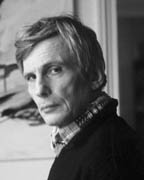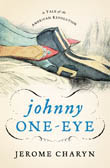|
|
|
BOOKSHELF
Jerome Charyn ’59 Looks Back to the Days of King’s College
By Maryam Parhizkar ’09


Jerome Charyn ’59
PHOTO: JERRY BAUER

In a sense, Jerome Charyn ’59 has been writing his most recent historical novel since he was 9, growing up on the streets of the South Bronx, “where you couldn’t even get The New York Times,” he says, and where George Washington “not only represented the country but also a kind of education, a kind of possibility that the Bronx just didn’t have. All we had was Yankee Stadium and the Bronx Zoo.”
Because there was little else, he says, “I always saw Washington as a kind of father and I always wanted to write about him,” even though, at that age, writing a novel was not yet feasible.
Now a long-established and much-praised writer, Charyn has found the opportunity to write about Washington. His newest work, Johnny One-Eye (W.W. Norton, $25.95), is a picaresque novel based on the events of the Revolutionary War as they unfolded in 18th-century Manhattan. The story is told through the one eye of John Stocking, a 17-year-old, brothel-raised double-agent whom Washington spares from the gallows. Soon afterward, the reader is following Stocking through a comic adventure in which he tries to help the Revolutionary Army keep hold of its territory while the British attempt to wrench it away. Publishers Weekly, in an early review, called the book “remarkable,” claiming that it “deserves to be spoken of in the same breath as E.L. Doctorow’s Ragtime.”
As a historical novel, Johnny One-Eye is in no way short of a colorful cast of characters. Washington’s character is especially surprising, as Charyn humanizes one of American history’s legendary figures. Charyn also portrays British general William “Sir Billy” Howe, a wonderfully scheming Alexander Hamilton [Class of 1778] and, especially important, Benedict Arnold (“the one hero I’ve ever had,” Stocking states).
Charyn’s attention to detail in the novel benefits from extensive research. For example, Stocking is a former King’s College (which became Columbia College) student, which in the novel’s context has suspended instruction. “I read many history books about New York during the 18th century, so I knew exactly where the College was placed,” says Charyn about the arduous research process, which involved researching the entire Revolutionary War. “There was an area near it, bordered on a street called Robinson Street, where ‘Holy Ground’ was, which was a street of whorehouses. That was all very well researched.”
At the College, Charyn studied history and comparative literature with a focus in Russian literature. “I lived at home, so I really didn’t have much of a life at the school … I was very much like a hermit, just reading books,” he says. Charyn recalls some of his most admired professors, however, listing among them history professor James P. Shenton ’49. “Each class that he taught was almost like a kind of play because he would act out various historical characters. And an English professor, Andrew Chiappe ’33, used to speak in a kind of poetry. He was like a poem that could walk and dance. It was amazing just to have these teachers; they were extraordinary, and I began to admire them.”
At 25, after publishing his first short story, Charyn attracted attention from literary agents, which led to offers from various publishers. “It was exactly at the time, the first time, that universities were opening up to writers of fiction.”
Charyn taught at Stanford from 1965–68, after which he held several professorships and lectureships in writing and comparative literature at universities including CUNY, Rice, NYU, the University of Texas and Princeton. Charyn also has received recognition for his writing, as a finalist for the Faulkner/PEN award, recipient of the Rosenthal Award from the Academy of Arts and Letters and Officier des Arts et des Lettres by the French Minister of Culture.
Charyn now is distinguished professor of film studies at the American University of Paris and travels between New York and Paris. His current project is a book on Charlemagne, which he calls his “9-11” novel. “I feel that after 9-11, the language of most American writers changed,” he says. “A kind of hysteria enters the language, a kind of sadness.”
As he reflects on his career in fiction, Charyn harkens back once more to his Columbia education, which contributed largely to his development as a writer. “Without that sort of swimming in language,” he comments, “I don’t think I would have had the courage to write.”
Maryam Parhizkar ’09 is majoring in English and is a former editorial assistant for CCT.
|
|
|






